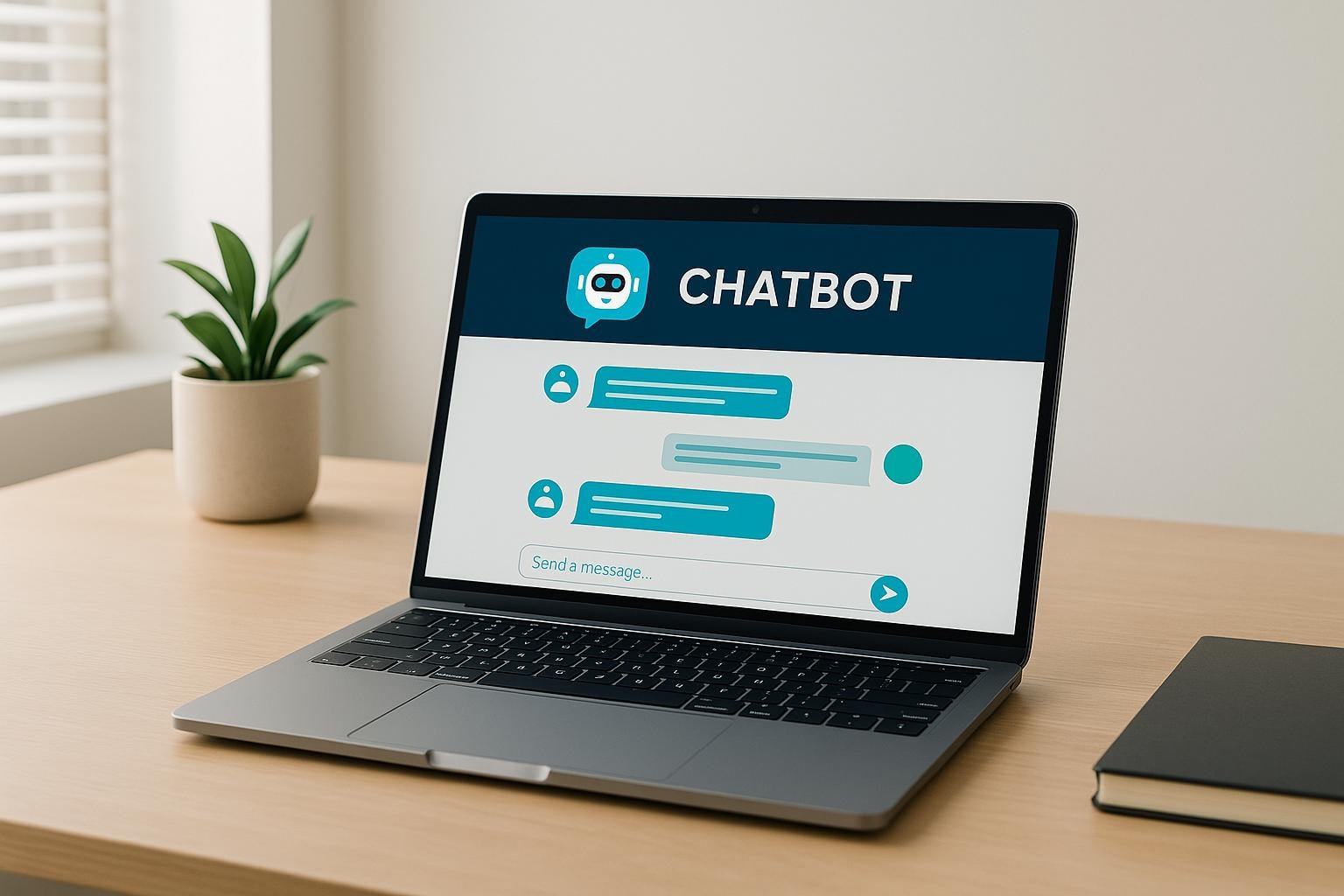
Top 5 NLP Platforms for Customer Service
Compare pricing, features, and setup requirements to find the right NLP solution for your business size and technical needs.

Written by
Adam Stewart
Key Points
- Match platforms to your existing tech stack for easier integration
- Choose pricing models that fit your call volume patterns
- Consider technical expertise needed before implementation
- Prioritize multi-language support for diverse customer bases
Meeting the rising demand for fast, accurate customer service can be tough, especially for small and medium-sized businesses (SMBs). Natural Language Processing (NLP) platforms help by automating customer interactions effectively, saving costs, and improving response times. Here’s a quick look at five leading NLP platforms and what they offer:
- Salesforce Einstein Language: Best for businesses already using Salesforce, with built-in sentiment analysis and seamless CRM integration. Pricing starts at $25–$75 per user/month.
- IBM Watson Assistant: Handles complex, multilingual queries with deep learning but requires technical expertise. Offers a free tier and scalable paid plans.
- Google Cloud NLP: API-based platform for text analysis with flexible pay-as-you-go pricing. Ideal for tech-savvy teams but needs development effort for full solutions.
- Amazon Comprehend: AWS-native tool with strong text analytics and entity recognition. Costs $0.0001 per 100 characters; integrates seamlessly with other AWS services.
- Kore.ai: Focuses on multi-agent orchestration and industry-specific templates. Custom pricing tailored to business needs.
Quick Tip: If you’re looking for a simple, voice-based solution, consider Dialzara, which integrates with over 5,000 applications and is ready to deploy in minutes.
Quick Comparison
| Platform | Key Strengths | Pricing | Best For |
|---|---|---|---|
| Salesforce Einstein | Seamless CRM integration, sentiment analysis | $25–$75/user/month | Salesforce users |
| IBM Watson Assistant | Multilingual, deep learning | Free tier + paid plans | Large orgs with technical teams |
| Google Cloud NLP | Flexible APIs, strong analytics | $1/1,000 API calls | Tech-savvy businesses |
| Amazon Comprehend | AWS integration, text analytics | $0.0001/100 characters | AWS-native organizations |
| Kore.ai | Multi-agent orchestration, templates | Custom pricing | Industry-specific needs |
Each platform has unique strengths, so choose based on your tech setup, budget, and customer service goals.
1. Salesforce Einstein Language
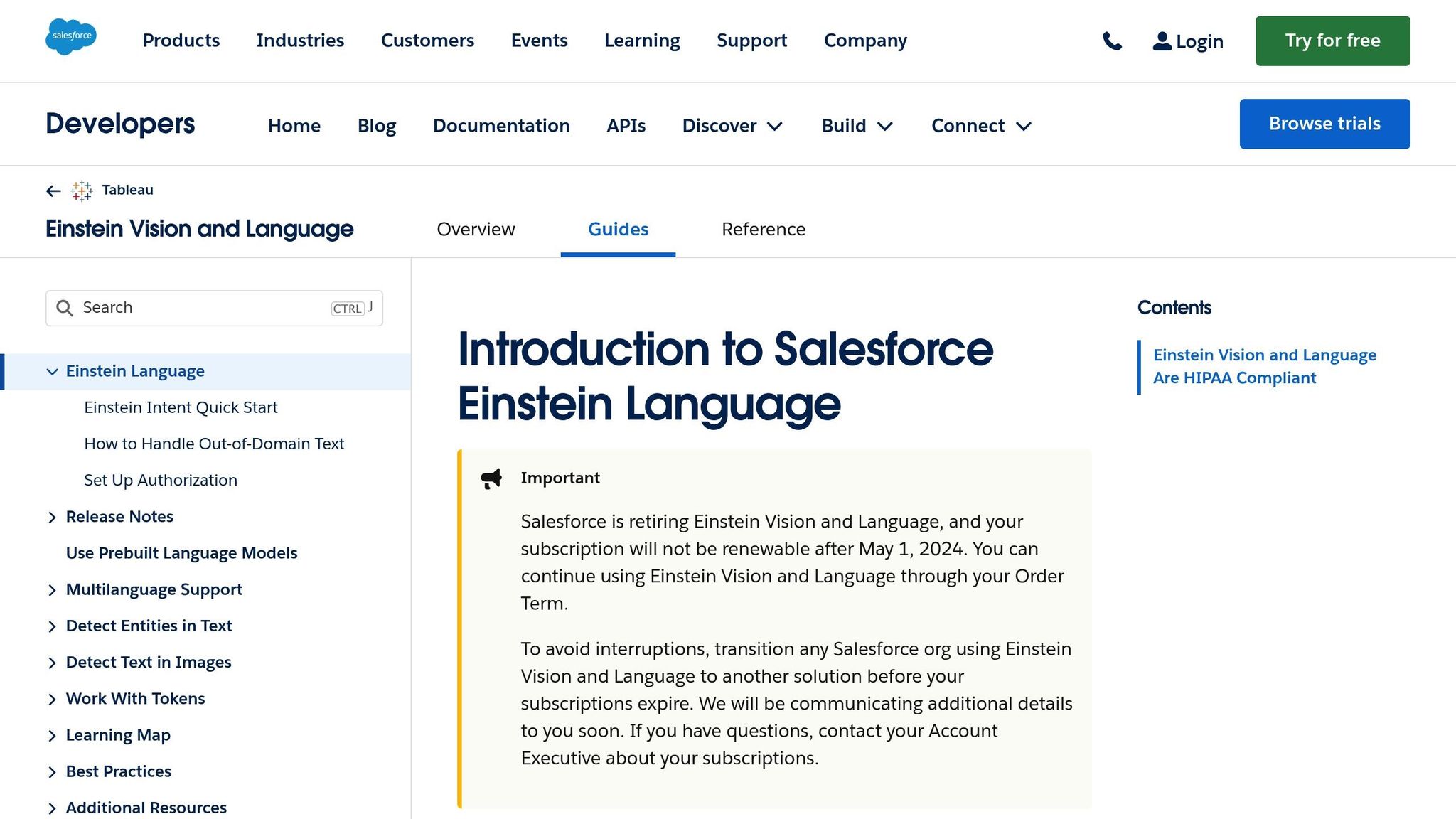
Salesforce Einstein Language is a built-in feature of the Salesforce ecosystem, designed to analyze customer communication for tone and intent, helping businesses respond more effectively to their customers [1].
Features
Einstein Language comes equipped with sentiment analysis tools that can detect emotions in emails, chats, and social media interactions. This allows agents to gauge whether a customer is frustrated, satisfied, or neutral before responding. The platform also identifies customer intent, such as whether they are making a purchase, lodging a complaint, or seeking more information. Beyond this, it automates the classification and prioritization of support tickets, ensuring urgent issues are addressed promptly while routine inquiries are handled efficiently. Additionally, it provides contextual insights, generates automated responses that mimic human interaction, and powers conversational AI features [1].
Pricing
Einstein Language is included with Salesforce Service Cloud, with entry-level plans for small and medium-sized businesses (SMBs) ranging from $25 to $75 per user per month. Additional costs may apply for premium support, higher API usage, or advanced analytics. Salesforce also frequently offers free trials or limited-time access, allowing new users to explore the platform's capabilities [1].
Integration
For businesses already using Salesforce, Einstein Language integrates seamlessly into their existing setup. It works directly with Salesforce CRM, Service Cloud, and Marketing Cloud, requiring no complicated configuration. Built-in APIs and connectors make it easy to create custom workflows. However, for companies not already on the Salesforce platform, adopting Einstein Language may involve a steeper learning curve and higher setup costs compared to standalone NLP tools [1].
Scalability
Built on Salesforce's powerful cloud infrastructure, Einstein Language scales effortlessly to handle increased demand. It caters to businesses of all sizes, from small startups to large enterprises, ensuring growing SMBs can continue to rely on its NLP capabilities. At the same time, it offers the enterprise-level security and compliance needed to manage high-volume operations [1]. Up next, we’ll take a closer look at IBM Watson Assistant to see how it approaches customer service NLP differently.
2. IBM Watson Assistant
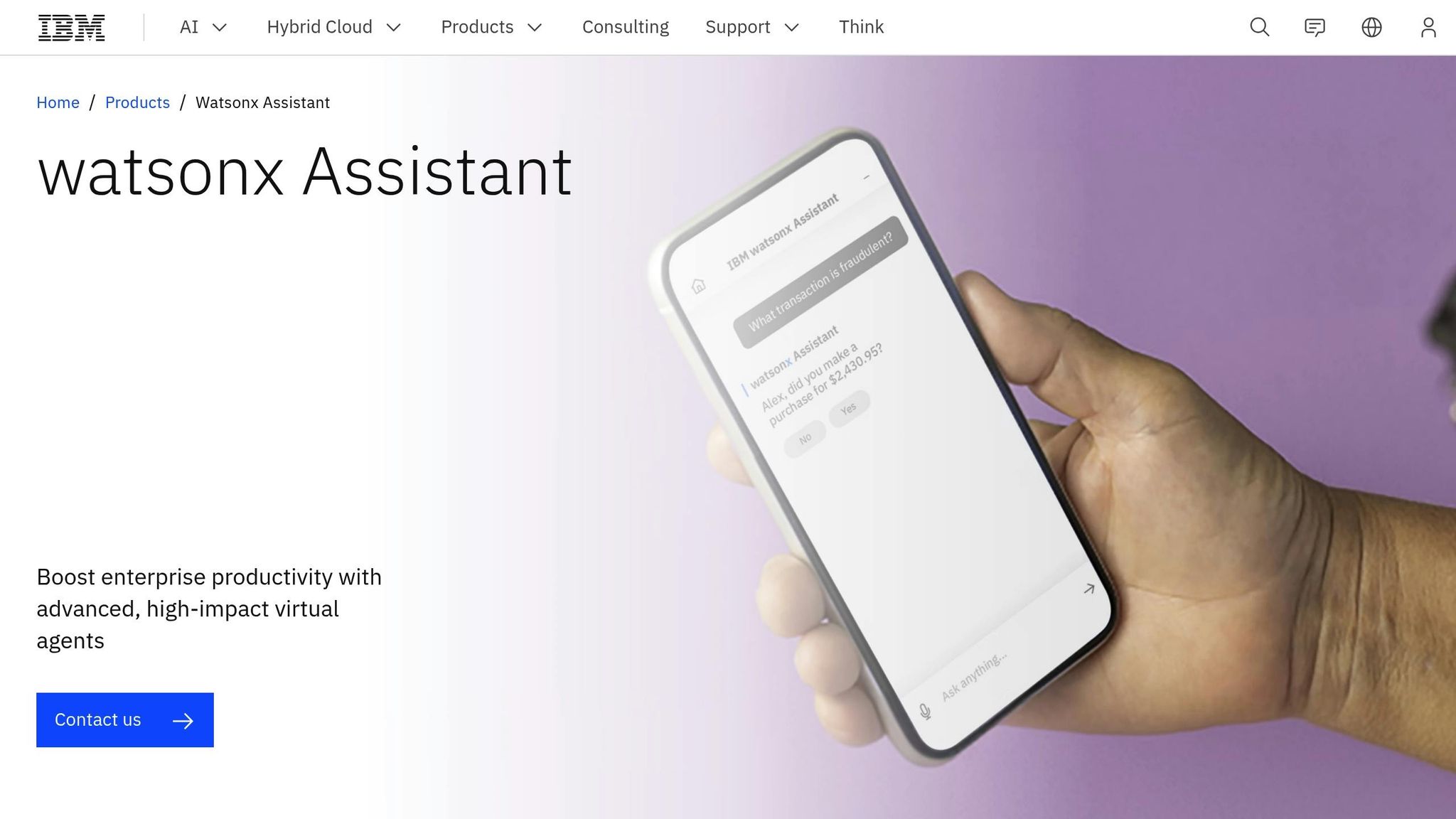
IBM Watson Assistant is a powerful NLP platform built on IBM Cloud, designed to handle complex interactions with ease. It’s a go-to solution for businesses aiming to enhance customer service in dynamic environments [1].
Features
Watson Assistant leverages deep learning to enable conversations that feel natural and personalized. It supports multiple languages, including Spanish and Mandarin, making it ideal for diverse U.S. audiences [1]. One standout feature is its ability to retain context across multiple exchanges, ensuring responses stay relevant throughout a conversation.
Its natural language understanding (NLU) capabilities allow it to grasp customer intent, even when queries are phrased in unconventional ways or include industry-specific terminology. You can deploy Watson Assistant across various channels - like web chat, mobile apps, and voice systems - ensuring a seamless experience for customers. Plus, its machine learning capabilities improve response accuracy over time [1].
Pricing
Watson Assistant offers a tiered pricing model based on usage and features, all quoted in U.S. dollars. For small businesses, there’s a free tier to explore its capabilities before committing to a paid plan. As your business grows, you can scale up to paid tiers, which are structured around the number of active users and required integrations. While the platform is competitively priced for enterprise-level solutions, advanced features and higher usage limits may come with additional costs [1].
Integration
The platform supports API-based integration and provides pre-built connectors for tools like Salesforce, Zendesk, and Slack. With access to over 5,000 applications via APIs or middleware, Watson Assistant can automate customer service without disrupting existing systems. It also integrates with CRM platforms to fetch real-time customer data, enabling responses tailored to purchase history or previous interactions [1]. For businesses already using IBM Cloud services, integration is especially seamless, though it’s compatible with other cloud providers as well.
Scalability
Watson Assistant scales automatically to meet growing demand, making it a great fit for businesses on the rise [1]. For instance, a healthcare clinic that adopted Watson Assistant saw a 60% drop in call wait times by using the platform to handle patient inquiries and schedule appointments. Its compliance with GDPR and HIPAA standards makes it particularly appealing for regulated industries like healthcare and finance, helping businesses deliver secure and consistent customer service [1].
Next, we’ll explore Google Cloud NLP’s approach.
3. Google Cloud NLP
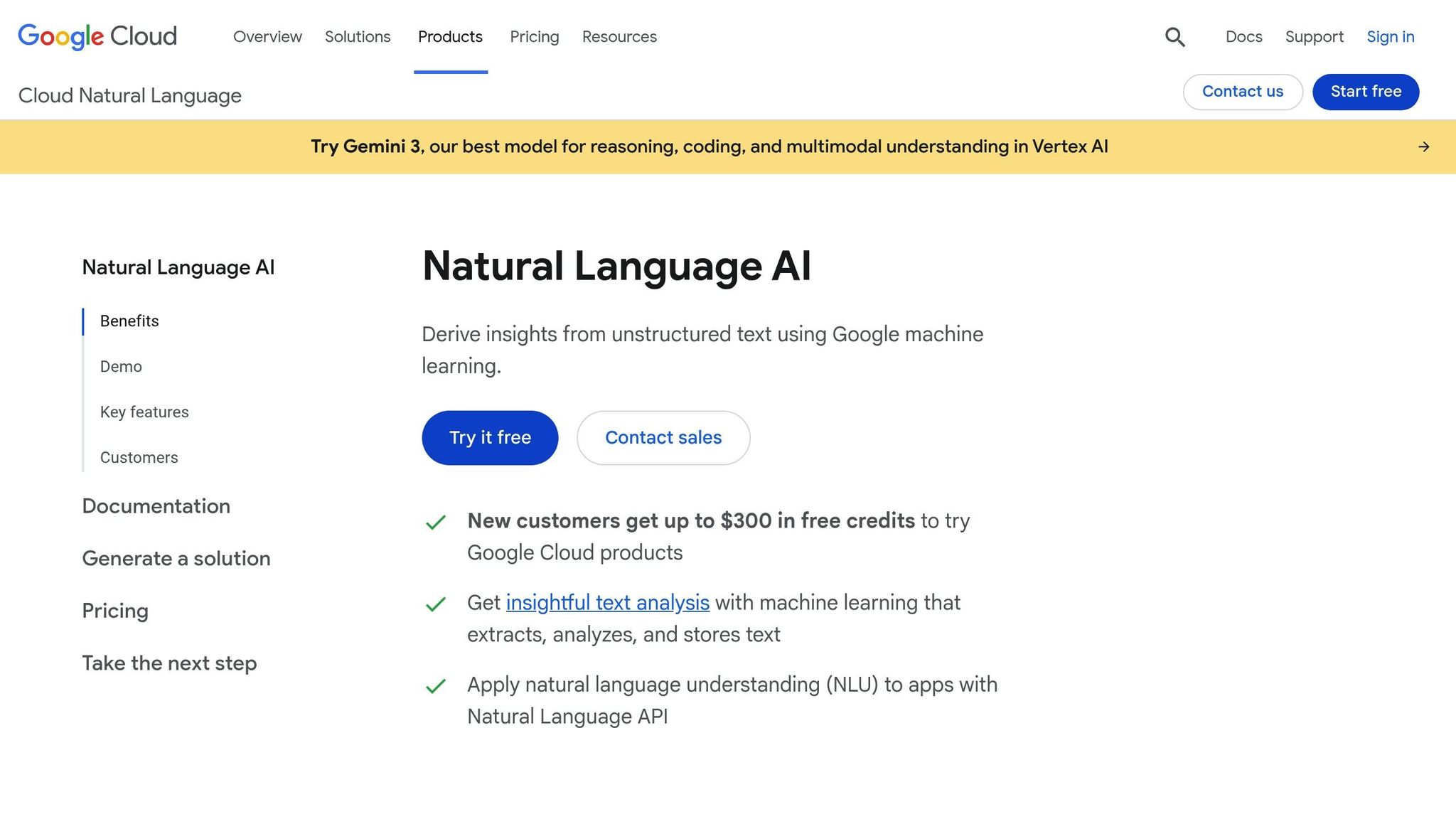
Google Cloud NLP (Natural Language API) is a powerful tool designed to improve customer service operations through advanced text analysis. Built on Google's reliable cloud infrastructure, it offers a range of features to help businesses interpret and respond to customer communications more effectively. Expanding on the capabilities of NLP tools, Google Cloud NLP focuses on delivering detailed insights from text.
Features
Google Cloud NLP offers several key features, including sentiment analysis, entity recognition, syntax analysis, and content classification. Sentiment analysis identifies customer emotions during interactions, making it easier to detect frustration or dissatisfaction and address issues promptly. Entity recognition extracts critical details like names, dates, locations, and product mentions, streamlining processes like ticket routing. Syntax analysis breaks down the structure of sentences, aiding in the interpretation of complex queries. Content classification, on the other hand, organizes support tickets by topic or urgency, helping teams prioritize responses. With multilingual support and automatic language detection, this tool is especially useful for businesses in the U.S. that cater to diverse audiences.
Pricing
Google Cloud NLP uses a pay-as-you-go pricing model, charging roughly $1.00 per 1,000 API calls for standard features like sentiment analysis, entity recognition, and syntax analysis [2]. For smaller operations or initial testing, the platform offers a free tier that includes up to 5,000 units of analysis per month. This pricing structure is designed to scale with usage, keeping costs manageable and aligned with actual demand.
Integration
The platform supports integration via REST and gRPC APIs, making it easy to embed its capabilities into customer service workflows. Businesses can send customer data to the NLP API and incorporate the insights into existing systems. For companies already using Google Cloud services, integration is even smoother, thanks to its compatibility with other Google tools, CRM platforms, and business applications.
Scalability
Google Cloud NLP is built to scale automatically, ensuring it can handle growing volumes of customer inquiries without compromising performance. Small and medium-sized businesses can start with minimal usage and seamlessly expand as their customer base grows. This ensures fast and reliable responses, even during high-demand periods.
Next, we’ll take a closer look at Amazon Comprehend’s approach.
4. Amazon Comprehend
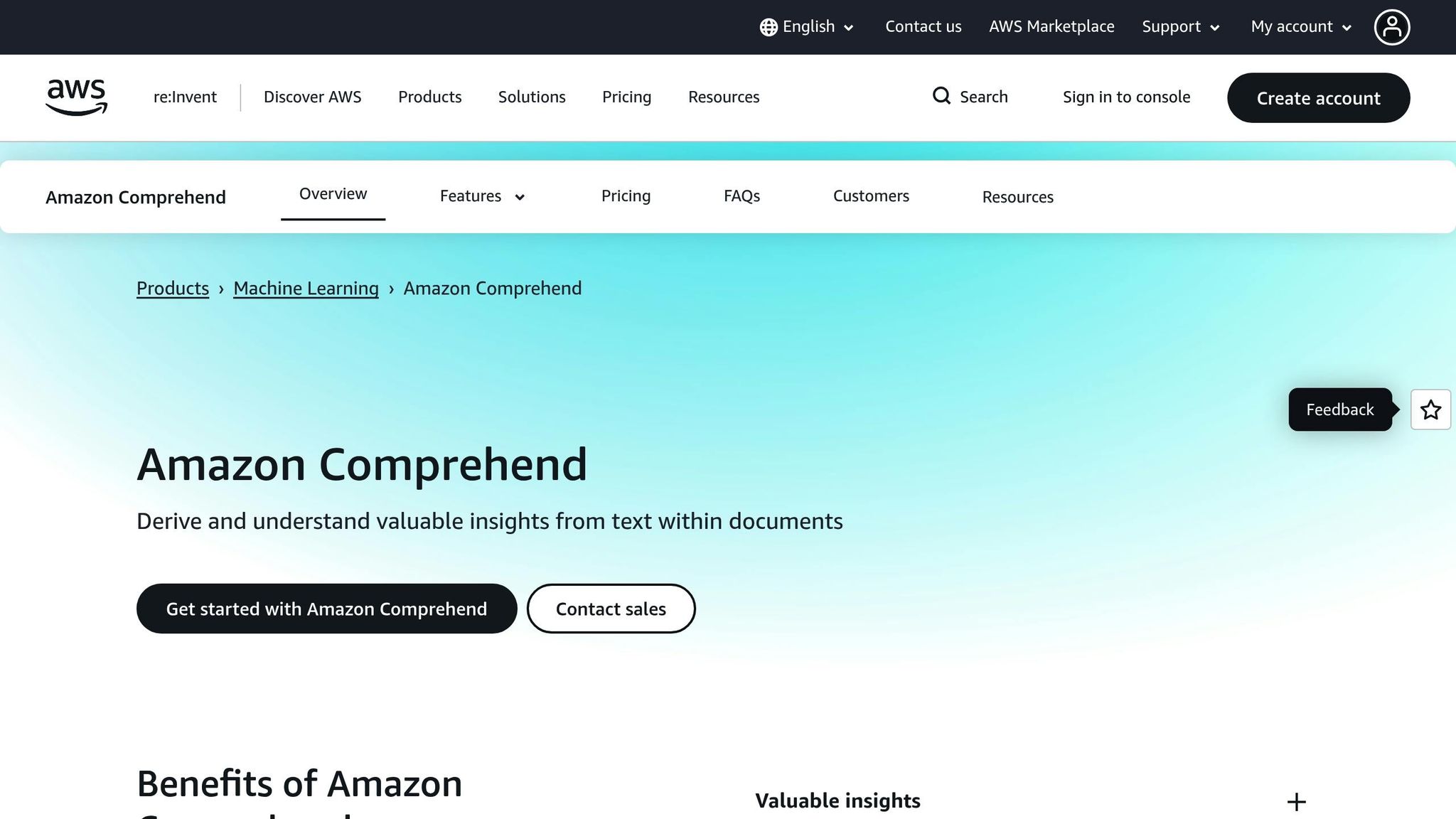
Amazon Comprehend is AWS's fully managed natural language processing (NLP) service, designed to bring advanced text analysis to customer service operations. Leveraging Amazon's powerful cloud infrastructure, it processes customer communications to extract actionable insights. This enables businesses, especially small and medium-sized enterprises (SMBs), to better understand and respond to customer needs.
Features
Amazon Comprehend offers a range of NLP tools that can simplify and enhance customer service. Its sentiment analysis feature identifies the emotional tone of customer messages, helping support teams prioritize urgent or sensitive interactions. The entity recognition tool automatically extracts critical details - like names, dates, product information, and account numbers - making ticket routing faster and more accurate.
The service also includes key phrase extraction, which highlights the main topics or concerns in customer communications. With language detection, it supports multiple languages, including English, Spanish, French, German, Italian, Portuguese, Arabic, Hindi, Japanese, Korean, and both Simplified and Traditional Chinese. Additionally, its custom classification feature allows businesses to train the system on their specific terminology, improving the precision of text analysis.
Pricing
Amazon Comprehend uses a pay-as-you-go pricing model, charging based on the number of text units processed. Each unit equals 100 characters, and standard features like sentiment analysis and entity recognition cost about $0.0001 per unit. For businesses looking to test the service, the free tier provides up to 100,000 units per month for the first 12 months. With no upfront fees or long-term commitments, this model is particularly appealing for businesses with fluctuating inquiry volumes.
Integration
As part of the AWS ecosystem, Amazon Comprehend integrates seamlessly with other AWS services. For example, it works with Amazon Connect to provide real-time sentiment analysis during customer calls and chats. Businesses can also connect it to existing customer service platforms using AWS APIs and Lambda functions, enabling automated ticket classification and prioritization. While integrations with tools like Zendesk or Freshdesk may require some customization, the service also works with AWS tools like S3 for batch processing and EventBridge for triggering automated workflows.
Scalability
Amazon Comprehend is built to handle operations of any size, processing millions of documents daily. Real-time analysis is fast, with processing latency typically under one second, allowing businesses to detect sentiment and route tickets efficiently. According to AWS case studies from 2024, companies using Comprehend for customer service automation have seen up to a 40% reduction in manual ticket triage time and a 25% boost in customer satisfaction scores [3]. And as demand increases, AWS automatically scales the service, ensuring consistent performance. Next, we’ll explore how Kore.ai takes a conversational approach to customer service.
sbb-itb-ef0082b
5. Kore.ai
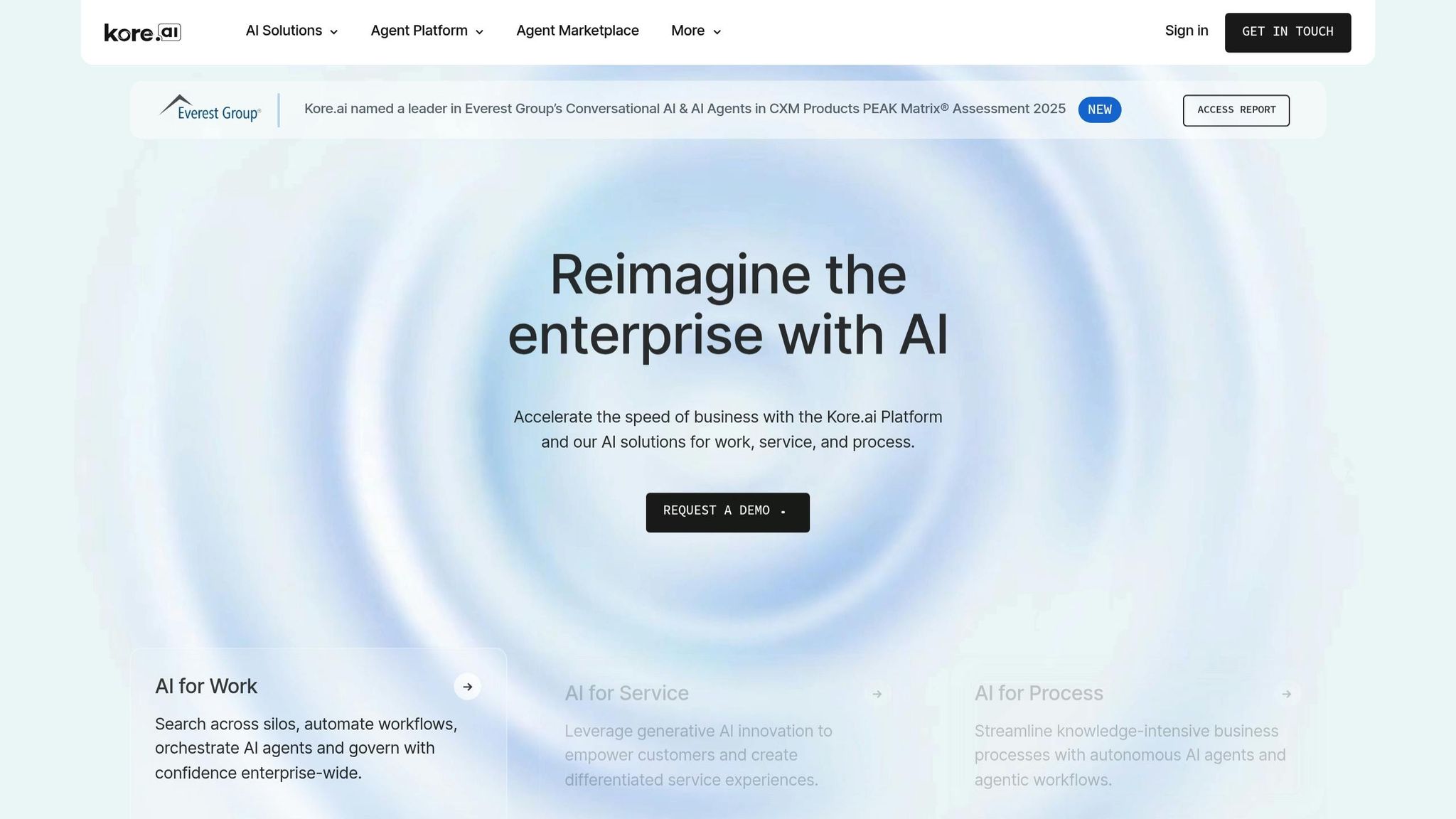
Kore.ai stands out among NLP platforms with its collaborative AI agent system. While it shares the goal of improving customer support like its competitors, Kore.ai’s ability to orchestrate multiple intelligent agents sets it apart. By blending generative AI with multi-agent coordination, the platform automates customer service tasks, tackling everything from basic inquiries to more complex challenges. It also provides tools for human agents when intervention is needed.
Features
Kore.ai’s multi-agent orchestration allows its AI agents to work together, share context, and manage a wide range of tasks. The platform includes Supervisor Agents to oversee interactions among specialized agents and employs both short-term and long-term Agent Memory to maintain context throughout customer interactions.
Its Search + Data AI Layer is another standout feature, offering quick data retrieval through over 100 pre-built connectors. It also supports Retrieval Augmented Generation, making it easier to access knowledge base information efficiently.
The platform caters to both technical and non-technical users with no-code and pro-code options. Users can design agents and workflows using intuitive templates, while developers can enhance functionality with custom coding. Features like Dialog GPT and Guided Full-Autonomy enable agents to handle entire customer journeys independently.
To meet enterprise needs, Kore.ai includes real-time analytics, audit logs, and stringent security features, ensuring compliance with industry standards.
Pricing
Kore.ai doesn’t list standard pricing on its website. Instead, it offers custom enterprise pricing tailored to each business’s unique needs and usage. Interested companies are encouraged to contact the sales team for specific pricing details.
Integration
Kore.ai integrates smoothly with major business tools like Salesforce, SAP, and Epic, as well as hundreds of other enterprise data sources. It also connects to unstructured data from collaboration platforms such as SharePoint, Slack, Confluence, and Google Drive.
For contact centers, Kore.ai works with established solutions like NICE, Genesys, and Salesforce Service Cloud, providing faster and more context-aware support. It supports deployment across various environments, including AWS, Microsoft Azure, Google Cloud, and even on-premise setups.
The platform also offers omnichannel support, enabling AI agents to interact via messengers, social media, email, live chat, and voice channels. With over 100 pre-built tools and dialog components, businesses can streamline workflows and speed up automation within conversations.
Scalability
Kore.ai has proven its ability to scale effectively in real-world applications. For example, Autodoc achieved a 74% first-call resolution rate, demonstrating the platform’s capacity to handle high interaction volumes without compromising quality.
Its multi-agent architecture is designed to grow alongside businesses, making it a fit for organizations of all sizes, from small startups to large enterprises.
Platform Comparison: Strengths and Weaknesses
When it comes to choosing the right platform for SMBs, each option brings its own set of advantages and challenges. Knowing these trade-offs can help businesses choose a solution that aligns with their needs, technical expertise, and budget.
Salesforce Einstein Language is a strong choice for businesses already using Salesforce. Its seamless integration within the Salesforce ecosystem makes connecting systems straightforward, and its advanced sentiment analysis and intent recognition offer valuable insights into customer interactions. However, for those outside the Salesforce ecosystem, the platform can be expensive and comes with a steeper learning curve for setup and customization.
IBM Watson Assistant shines in handling complex, multilingual customer queries using its advanced deep learning algorithms. It’s a scalable option with enterprise-level capabilities, but smaller SMBs may find the initial setup daunting and the pricing structure less accessible. Leveraging its full potential often requires a team with strong technical skills.
Google Cloud NLP delivers impressive language understanding and integrates smoothly with Google’s cloud services. Its developer-friendly design and broad language support are appealing, but as an API-first platform, it requires additional development to create complete customer service solutions. While its pay-as-you-go pricing is flexible, businesses with fluctuating volumes may face unpredictable costs.
Amazon Comprehend offers excellent text analytics and entity recognition, working seamlessly with AWS services. Like Google Cloud NLP, it operates on a usage-based pricing model, which can be cost-effective for some but expensive with high usage. It’s not an out-of-the-box solution and requires technical resources for successful implementation.
Kore.ai provides unique features like a multi-agent orchestration system and industry-specific templates. Its mix of no-code and pro-code options makes it accessible for both technical and non-technical users. However, its custom pricing can be unclear, and some users may still find customization complex.
Here’s a quick breakdown of each platform’s strengths, weaknesses, and ideal fit:
| Platform | Key Strengths | Main Weaknesses | Best For |
|---|---|---|---|
| Salesforce Einstein | Seamless CRM integration, predictive insights | High costs, limited flexibility outside Salesforce | Businesses already using Salesforce |
| IBM Watson Assistant | Handles complex queries, multilingual support | Challenging setup, premium pricing | Large organizations with technical teams |
| Google Cloud NLP | Developer-friendly, strong analytics | Requires extra development, variable costs | Tech-savvy businesses |
| Amazon Comprehend | AWS integration, flexible pricing | Needs technical integration | AWS-native organizations |
| Kore.ai | Multi-agent system, quick deployment templates | Custom pricing, setup complexity | Businesses needing specialized solutions |
Pricing and Integration Insights
Pricing models differ significantly across platforms. Salesforce Einstein Language is bundled with Salesforce subscriptions, which may be cost-efficient for existing users but pricey for newcomers. Amazon Comprehend, on the other hand, offers granular pricing at approximately $0.0001 per unit[1].
Integration capabilities also vary. Salesforce Einstein and IBM Watson Assistant boast strong ecosystem ties but often require technical expertise to implement. Google Cloud NLP and Amazon Comprehend integrate well within their respective cloud ecosystems but demand additional development for end-to-end customer service workflows. Kore.ai simplifies integration with pre-built connectors and templates tailored to various industries.
A Turnkey Alternative: Dialzara

For businesses seeking simplicity, Dialzara stands out. Unlike platforms requiring complex API integrations, Dialzara offers a ready-to-use voice-based solution. As an AI-powered virtual phone answering service, it integrates with over 5,000 business applications and can be deployed in just minutes. By reducing staffing costs and offering minimal technical complexity, it’s an excellent option for businesses looking for quick and easy setup.
Scalability Considerations
All five platforms are scalable, though the costs and ease of scaling differ. IBM Watson Assistant and Kore.ai are well-suited for enterprise-level scalability. Google Cloud NLP and Amazon Comprehend offer flexible, cloud-native scaling, while Salesforce Einstein Language scales effectively within its ecosystem - though costs may increase significantly as usage grows.
Conclusion
Selecting the best NLP platform for customer service means taking a close look at your business's unique needs, technical resources, and future goals. The five platforms we've discussed each bring distinct strengths to the table, catering to a variety of business situations.
Consider your existing ecosystem: If your business already operates within Google Cloud or AWS, platforms like Google Cloud NLP and Amazon Comprehend offer seamless integration and can enhance your customer service automation efforts.
Budget matters for SMBs. If you're a small or medium-sized business working with limited resources, platforms with straightforward, results-driven pricing may be more practical. While enterprise tools like IBM Watson Assistant offer robust multilingual features, they might be too costly for smaller budgets. Instead, look for platforms that provide clear ROI from the start.
Technical support is key. If your IT team is stretched thin, you'll want a solution that’s easy to deploy and doesn’t require heavy customization. Kore.ai, for instance, offers pre-built templates and configurations tailored to specific industries, making implementation faster and easier. On the other hand, API-heavy platforms might require additional development resources.
Customer service isn’t just about text anymore. For SMBs focused on voice-based support, Dialzara is a strong contender. It integrates with over 5,000 applications, sets up in minutes, and can cut costs by up to 90%, making it a practical choice for phone-based automation.
Plan for growth. As your business scales, your platform should be able to grow with you. Cloud-native platforms with flexible pricing can handle increased customer volume, support additional languages, and adapt to new feature demands. Make sure your choice aligns with your long-term goals.
To ensure success, start by aligning your service channels and tech stack with your most pressing challenges. Pick a platform that not only solves those challenges but also sets the stage for future growth.
Test before you commit. Many platforms offer free trials or money-back guarantees, giving you a chance to evaluate how well they integrate, how users adapt, and how they perform in real-world scenarios. This hands-on approach minimizes risk and helps you make the right decision.
In today’s customer service landscape, platforms with outcome-based pricing and industry-specific solutions are leading the way. Prioritize tools that deliver immediate value while offering the scalability to meet your evolving needs. With the right platform, you can achieve both operational efficiency and long-term excellence in customer service.
FAQs
What should businesses look for in an NLP platform for customer service?
When selecting an NLP platform for customer service, businesses should prioritize factors like easy integration, cost-efficiency, and the capacity to manage large volumes of inquiries without sacrificing quality.
One standout option is Dialzara, an AI-powered virtual phone answering service designed to simplify customer interactions. It handles tasks such as answering calls, transferring calls, relaying messages, and booking appointments - all available 24/7. With its realistic AI voice technology and compatibility with over 5,000 business applications, Dialzara offers a smooth and efficient solution that can cut customer service costs by up to 90%.
Getting started is straightforward. Customize your AI agent to align with your business needs, select a voice and phone number, and you're ready to begin answering calls. Dialzara delivers a professional, dependable, and budget-friendly customer service experience tailored specifically for your business.
How do NLP platform pricing models affect small and medium-sized businesses?
NLP platform pricing plays a crucial role in shaping the operational costs and scalability of small and medium-sized businesses (SMBs). Take Dialzara's AI virtual phone answering service as an example - it’s designed to cut customer service expenses by up to 90% through automation. Tasks like answering calls, relaying messages, and booking appointments are handled seamlessly, reducing the need for large HR teams.
This affordable solution not only slashes overhead costs but also empowers businesses to manage a higher volume of customer inquiries without compromising on service quality. By simplifying operations, Dialzara enables SMBs to stay competitive, prioritize growth, and deliver top-notch customer experiences.
What challenges might arise when integrating an NLP platform into your existing tech setup?
Integrating a natural language processing (NLP) platform into your existing tech setup can come with its fair share of hurdles. Common challenges include dealing with compatibility issues in older systems, ensuring smooth data exchange between platforms, and tailoring the NLP solution to fit specific industry needs or workflows.
To tackle these challenges, start by selecting an NLP platform with strong API support that can easily connect with your current tools. Conducting thorough tests and rolling out the implementation in phases can help spot and fix potential problems early on. Equally important is providing your team with proper training and maintaining clear, detailed documentation to make the transition as seamless as possible.
Summarize with AI
Related Posts
Voice Sentiment Analysis: 7 Techniques That Help AI Understand Emotions
Explore seven key techniques in voice AI sentiment analysis that enhance customer interactions by understanding emotions in real time.
Top AI Tools for Personalized Customer Service
Explore how AI tools enhance personalized customer service for SMBs, from chatbots to email marketing, while saving costs and improving efficiency.
AI Customer Service Platform Essentials
Explore the essential features of AI customer service platforms and discover the best AI tools for customer service. Learn about conversational AI, the best AI platforms, and the future trends in AI customer service.
12 Best AI Customer Service Platforms 2024
Discover the top 12 AI customer service platforms for 2024 that offer automation, personalized support, and cost savings. Find the best platform for your business needs.
